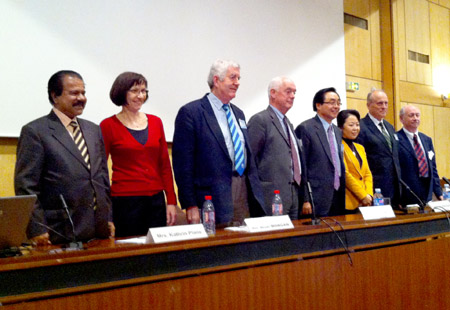![]()
The Words of the Marsh Family
|
|
The Words of the Marsh Family |

Paris, France -- UPF's first European Leadership Conference of 2012 took place at the UNESCO headquarters in Paris April 12-13 under the patronage of the Permanent Delegations of the Sultanate of Oman and the Republic of Kenya to UNESCO.
In addition to UPF and the Women's Federation for World Peace, organizers included the Center for the Study and Promotion of Culture and Communication in Africa, the Forum of Organizations fo's spirit Panel Speakers UNESCO Conferencer International Solidarity on Migration Issues, the International Institute for Strategic Studies, and the Geneva Interfaith and Intercultural Alliance.
The Chair, the President of the 33rd General Conference of UNESCO and Counselor Delegation of Oman to UNESCO, H.E. Dr. Moosa Jaafar Hassan, opened Session One by offering a few initial words stating that the need for a new vision means that we need new strategies while not excluding other global tests. To form those new strategies we need to involve intellectuals, religious, academics, and civil society in the support of policymakers. Concluding the session he commented that ''I hope that UNESCO can learn from UPF in the way that you are working for peace'
Dr. Boutros Boutros-Ghali the Patron of the Conference, had to travel to Egypt at the last moment and his speech was read by his secretary, Dr. Sonia Ramzi. In his speech he reflected that small conflicts by unarmed groups can cause huge problems among civil populations. He referred to his initiative in 1992 to promote conflict prevention diplomacy and establish principles for conflict prevention. He knows well the reluctance of the international community to respond to issues that everyone knows about but does not want to be involved in. He said the micro-disarmament of small groups or the prevention of the buildup of arms by small or poor nations was important. He stated that, 'one tank is equivalent to 500 classrooms' adding that, 'land mines can cause problems long after the conflict has ended.' He concluded on a positive note saying, 'I trust the future because I know that men and women of goodwill are working to set up frameworks of relations to ensure peace for future generations.'
Prof. Akiko Yamanaka, Senior Visiting Scholar at Churchill College, Cambridge and a Former Deputy-Minister for Foreign Affairs of Japan, in a speech entitled, 'A New Vision for Non-Traditional Security with Human Security' considered a new definition of human security. She sees the need for a 'two-handed policy: one is military preparation and the other is non-military diplomacy' in a tide of history that is in a 'transition period.'
She said, 'The nature of security has been evolving since the end of the cold war from "against" to "with." During the cold war, security meant being "against" certain countries. However, the concept of security now should be "with" every nation /state that is a part of each region. This means that we must make efforts to establish trustworthy relations among countries so that peace and stability can be established in the each region on the globe. We must also recognize that security is increasingly complex and multifaceted.
Prof. Yamanaka added, 'The concept of security is being broadened considerably and continuously to incorporate military, political, economic, societal, and environmental dimensions, and the inter-linkages between them. The traditional model of security rests upon military defense of national territory. Yet for many people in the world – perhaps even most – the much greater threats to security come from internal conflicts, disease, hunger, environmental contamination, street crime, or even domestic violence. And for others, a greater threat may come from their own country itself, rather than from an 'external' adversary. We are moving towards a concept of human security which revolves around individual and community welfare. After the terrorist events on September 11, the need for international cooperation that exceeds national borders has become more important than before.'
Dr. Ali Rastbeen commented on the importance of resolving the Middle East conflicts to establish a strong foundation for world peace. The Middle East has been the main realm of geopolitical strategies and a nerve center of the contemporary world. He believes that awareness of human development has grown but it is conflicting with autocratic realms that dominate many nations. The charter of the UN is the frame work for the new, more peaceful order. He also emphasized the power of education for promoting peace.
The Chair of UPF-Europe, Dr. Yong Cheon Song, in the keynote address, expressed his gratitude to UNESCO saying that of all the different constituent organizations of the UN, UPF perhaps feels the greatest natural affinity with UNESCO. "UNESCO's agenda and UPF's agenda share so many common areas of concern and interest. UNESCO's core areas of activity -- education, science and culture." He congratulated UNESCO for promoting a culture of peace, based on the insight that true peace can only begin "in the hearts of men."